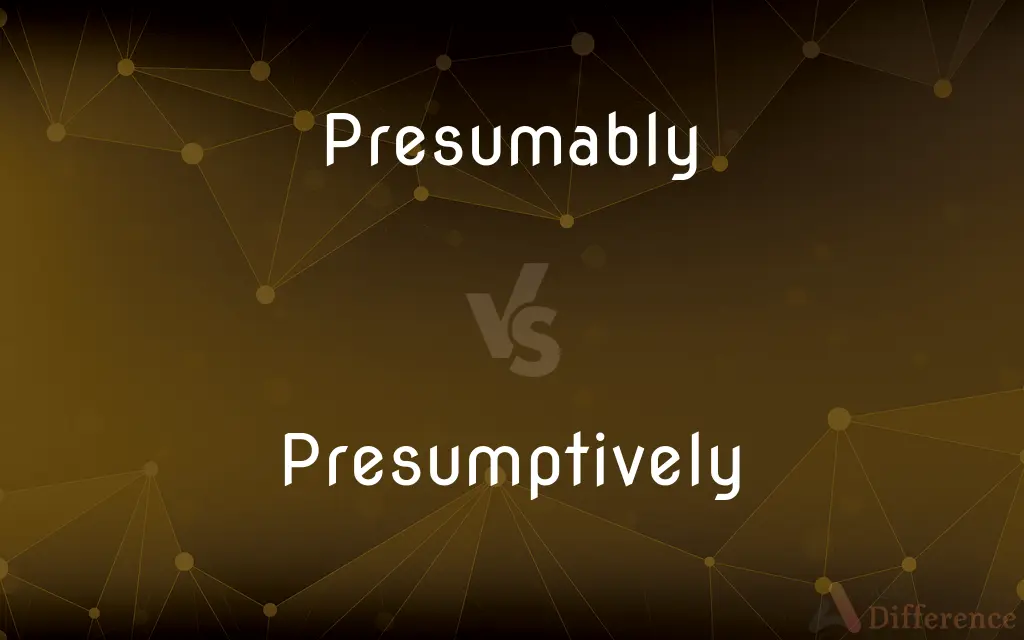Presumably vs. Presumptively — What's the Difference?
By Fiza Rafique & Maham Liaqat — Updated on April 25, 2024
Presumably is used to express something based on probable evidence, while presumptively suggests an assumption made as a legal inference or default.

Difference Between Presumably and Presumptively
Table of Contents
ADVERTISEMENT
Key Differences
Presumably is used to indicate that something is very likely true based on available evidence or logical assumption, without proof. On the other hand, presumptively is often used in legal contexts to denote something accepted as true until proven otherwise, based on a presumption or legal principle.
While presumably applies in everyday scenarios where conclusions are drawn from indirect evidence or common sense, presumptively is specific to situations where a legal framework or formal assumption is in place.
Presumably does not imply any formal legal backing; it simply suggests a reasonable guess based on what appears to be true. Conversely, presumptively carries a weight of authority, often used to describe conditions or facts taken as given within the scope of legal proceedings.
The use of presumably allows for some degree of uncertainty, acknowledging that while the assumption is reasonable, it is not infallible. In contrast, presumptively holds until specifically challenged and disproven, often within a legal context.
Presumably is more flexible and can be revised as new information becomes available, reflecting a non-binding belief or hypothesis. Presumptively, however, establishes a more fixed stance due to its legal implications, serving as a default position until countered.
ADVERTISEMENT
Comparison Chart
Definition
Based on probable evidence or logic
Based on a legal presumption
Context
General use, informal reasoning
Legal contexts, formal proceedings
Implication of Authority
None
Legal authority or formal assumption
Flexibility
Flexible, can change with new info
Less flexible, holds until disproven
Use
General assumptions
Legal inferences or default positions
Compare with Definitions
Presumably
Likely or probable.
Presumably, the event will be postponed if it rains.
Presumptively
In a manner that assumes as default.
The conditions were presumptively dangerous.
Presumably
Based on reasonable assumption.
He will presumably want to rest after his long trip.
Presumptively
Reflecting a statutory assumption.
The goods were presumptively stolen, triggering the search.
Presumably
Reflecting an educated guess.
Presumably, that's where they found the evidence.
Presumptively
Based on legal inference.
The assets were presumptively considered part of the estate.
Presumably
Indicative of a logical conclusion.
They are presumably the last to arrive since the meeting has started.
Presumptively
As a matter of presumption in law.
He was presumptively entitled to the benefits under the new policy.
Presumably
Used to express an assumption.
Presumably, you're not interested in leaving early.
Presumptively
Assumed to be true unless proven otherwise.
The document was presumptively valid until challenged.
Presumably
Capable of being presumed or taken for granted; reasonable as a supposition
Presumable causes of the disaster.
Presumptively
Based on a presumption; presumed
The party's presumptive nominee.
Presumably
Able to be sensibly presumed
Presumably, he will attend the opening.
Presumptively
Providing a reasonable basis for belief or acceptance
Presumptive evidence.
Presumably
In a presumable manner; by, or according to, presumption.
Presumptively
Usage Problem Presumptuous
Presumptive behavior.
Presumably
By reasonable assumption;
Presumably, he missed the train
Presumptively
In a presumptive manner
Presumptively
As is presumed to be the case
Presumptively
By presumption, or supposition grounded or probability; presumably.
Presumptively
By reasonable assumption;
Presumably, he missed the train
Common Curiosities
Is presumptively a binding assumption?
Yes, in legal terms, presumptively is often binding and remains valid unless legally disproven.
What is a common mistake when using presumably?
A common mistake is using presumably when certainty is required; it should only be used when making an educated guess.
What does presumably mean in a conversation?
In a conversation, presumably is used to suggest something is likely true based on available evidence or logic.
What synonyms can be used for presumably?
Synonyms for presumably include probably, likely, and possibly.
Why is presumably used in speculative discussions?
Presumably is used in speculative discussions to denote that a statement is based on logical inference or apparent evidence, helping frame the level of uncertainty.
Can presumptively be used outside of legal contexts?
While typically used in legal contexts, presumptively can be applied in discussions where assumptions are made based on common defaults or rules.
How does the certainty level differ between presumably and presumptively?
Presumably indicates a high likelihood but acknowledges uncertainty, whereas presumptively holds more certainty until proven otherwise.
What synonyms can be used for presumptively?
Synonyms for presumptively include by presumption, legally assumed, and as supposed.
How does one challenge a presumptive statement?
In legal contexts, a presumptive statement is challenged by providing evidence or legal argument that disproves the presumption.
Can the use of presumably in scientific contexts be appropriate?
Yes, presumably can be used in scientific contexts when discussing hypotheses or interpretations not yet fully supported by data.
Share Your Discovery

Previous Comparison
Round vs. Spherical
Next Comparison
Drag vs. ResistanceAuthor Spotlight
Written by
Fiza RafiqueFiza Rafique is a skilled content writer at AskDifference.com, where she meticulously refines and enhances written pieces. Drawing from her vast editorial expertise, Fiza ensures clarity, accuracy, and precision in every article. Passionate about language, she continually seeks to elevate the quality of content for readers worldwide.
Co-written by
Maham Liaqat










































